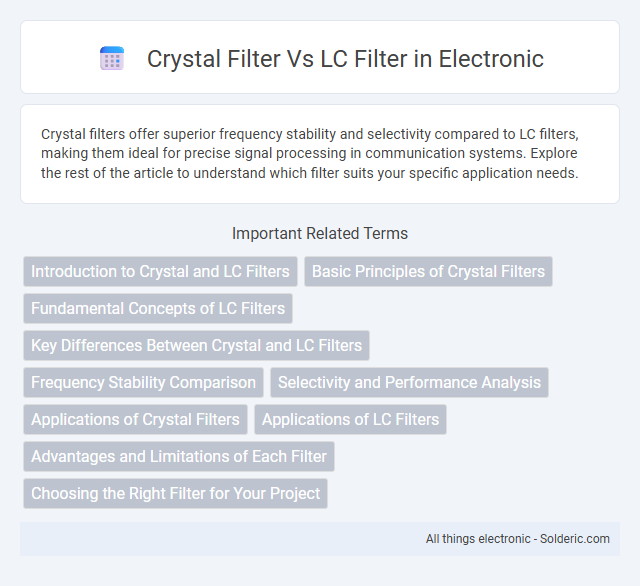Crystal filters offer superior frequency stability and selectivity compared to LC filters, making them ideal for precise signal processing in communication systems. Explore the rest of the article to understand which filter suits your specific application needs.
Comparison Table
| Feature | Crystal Filter | LC Filter |
|---|---|---|
| Frequency Stability | High, due to quartz crystal resonance | Moderate, affected by temperature and component tolerances |
| Quality Factor (Q) | Very high (10,000 to 100,000) | Low to moderate (10 to 1000) |
| Size | Compact but fixed frequency | Variable size, often larger for high Q |
| Tuning | Fixed frequency, no tuning required | Adjustable by variable inductors/capacitors |
| Insertion Loss | Low | Higher compared to crystal filters |
| Cost | Higher due to precision components | Lower cost, widely available components |
| Applications | Precision frequency filtering in RF, IF stages | General purpose filtering in electronics and RF circuits |
| Frequency Range | Up to hundreds of MHz | Typically up to a few hundred MHz |
Introduction to Crystal and LC Filters
Crystal filters utilize quartz crystals to achieve high frequency stability and exceptional selectivity, making them ideal for precise frequency control in communication systems. LC filters, constructed from inductors and capacitors, offer versatile frequency response with easier tunability but generally lower Q-factor and stability compared to crystal filters. The choice between crystal and LC filters depends on application requirements such as bandwidth, insertion loss, and frequency accuracy.
Basic Principles of Crystal Filters
Crystal filters operate by utilizing the piezoelectric effect of quartz crystals to achieve highly selective frequency filtering with sharp resonance and minimal energy loss. Unlike LC filters that rely on inductors and capacitors to create resonant circuits, crystal filters maintain exceptional frequency stability and precision due to the inherent properties of quartz. Your choice of filter depends on the need for precise frequency selection, where crystal filters excel in narrow bandwidth and stable performance.
Fundamental Concepts of LC Filters
LC filters utilize inductors (L) and capacitors (C) to form resonant circuits that selectively pass or block specific frequency ranges, making them essential in radio frequency (RF) and audio applications. The fundamental concept revolves around tuning the LC circuit to a desired frequency using the inductive reactance and capacitive reactance, which cancel each other out at resonance, resulting in minimal impedance. Your choice between a crystal filter and an LC filter depends on factors like frequency stability and precision, where LC filters offer flexibility but less stability compared to crystal filters.
Key Differences Between Crystal and LC Filters
Crystal filters provide superior frequency stability and selectivity compared to LC filters due to their use of quartz crystals with precise resonant frequencies. LC filters, made of inductors and capacitors, tend to be more flexible and cost-effective but suffer from lower quality factors and less stable tuning. Your choice depends on required filter precision, size, cost, and operating frequency range.
Frequency Stability Comparison
Crystal filters exhibit superior frequency stability due to their reliance on the mechanical resonance of quartz crystals, which maintain a constant frequency over varying temperatures and environmental conditions. In contrast, LC filters depend on inductors and capacitors, whose values can drift significantly with temperature changes, leading to less stable frequency performance. This characteristic makes crystal filters ideal for applications requiring high precision and minimal frequency variation.
Selectivity and Performance Analysis
Crystal filters exhibit superior selectivity compared to LC filters due to their high Q factor, enabling precise frequency discrimination and minimal signal loss. LC filters offer broader bandwidth and easier tunability but suffer from lower performance in applications requiring sharp frequency cutoffs. Your choice depends on whether you prioritize ultra-narrow band filtering or flexible frequency adjustment in your circuit design.
Applications of Crystal Filters
Crystal filters are essential in communication systems requiring high selectivity and stability, such as in radio receivers and transmitters. Their ability to maintain a precise frequency response makes them ideal for narrowband signal filtering in applications like cellular networks and GPS devices. Your choice of a crystal filter enhances signal clarity and reduces interference compared to LC filters, which are better suited for broader, less sensitive filtering needs.
Applications of LC Filters
LC filters are widely used in radio frequency (RF) and audio applications due to their ability to selectively pass desired frequencies while attenuating unwanted signals, making them ideal for tuning and noise reduction in radios, transmitters, and receivers. Their compact design and tunability allow integration into communication devices, power supplies, and signal processing equipment. Your choice of an LC filter is optimal for scenarios requiring adjustable frequency responses and cost-effective filtering solutions.
Advantages and Limitations of Each Filter
Crystal filters offer superior frequency stability and high Q-factor, making them ideal for precise frequency selection in communication systems. Their limitations include higher cost and limited bandwidth flexibility compared to LC filters. LC filters provide greater design versatility and lower production expenses but suffer from lower frequency stability and higher insertion loss than crystal filters.
Choosing the Right Filter for Your Project
Choosing the right filter for your project depends on factors like frequency stability, selectivity, and power consumption. Crystal filters offer superior frequency precision and narrow bandwidth ideal for high-frequency applications, while LC filters provide flexibility with adjustable frequency ranges and lower cost for broader signal filtering. Assess your project's specific performance requirements and budget to determine whether a crystal or LC filter best suits your needs.
Crystal filter vs LC filter Infographic

 solderic.com
solderic.com